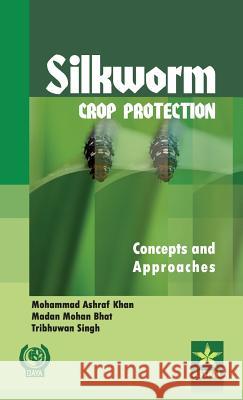Silkworm Crop Protection: Concepts and Approaches » książka
Silkworm Crop Protection: Concepts and Approaches
ISBN-13: 9789351241843 / Angielski / Twarda / 2014 / 244 str.
The silkworms are susceptible to various diseases and attacked by pests and parasites. The diseases and pests together cause considerable damage to the silk industry. The diseases are caused by biological, chemical, nutritional and environmental factors. The biological factors causing diseases are viruses, bacteria, fungi, protozoa and arthropods, all of which are parasites; and all except arthropods are infectious. Agro-chemicals, pyrethroids, exhaust gases from automobiles and factories, smoke, residue from disinfectants, etc. are among the chemical agents causing diseases. The chemical agents are non-parasitic and non-infectious. The mulberry silkworm is attacked by insects such as tachinid parasitoids, dermestid beetles, ants, earwigs etc. The pests and parasites other than insects are mite, nematode, wall-lizards, rodents, squirrels and birds that are also known to inflict considerable damage to silkworm and its crops. The major challenge the silk producing nations all over the world, therefore confront are the damage caused by the pests and diseases of the silkworm. In this backdrop, this book on "Silkworm Crop Protection: Concepts and Approaches" is prepared with the objective to explain the various strategies to be adopted in the prevention and control of various pests and diseases of the silkworm. It is designed to address wide range of readers, experts, university teachers, students, researchers, technologists, policy makers and fulfill the hopes and aspirations of all those engaged in sericulture. The information furnished in this book will be of immense importance not only to Indian sericulturist and will serve as a reliable guide for all those involved in both upstream and downstream processes of silkworm rearing and silk production.
The silkworms are susceptible to various diseases and attacked by pests and parasites. The diseases and pests together cause considerable damage to the silk industry. The diseases are caused by biological, chemical, nutritional and environmental factors. The biological factors causing diseases are viruses, bacteria, fungi , protozoa and arthropods, all of which are parasites; and all except arthropods are infectious. Agro-chemicals, pyrethroids, exhaust gases from automobiles and factories, smoke, residue from disinfectants, etc. are among the chemical agents causing diseases. The chemical agents are non-parasitic and non-infectious. The mulberry silkworm is attacked by insects such as tachinid parasitoids, dermestid beetles, ants, earwigs etc. The pests and parasites other than insects are mite, nematode, wall-lizards, rodents, squirrels and birds that are also known to inflict considerable damage to silkworm and its crops. The major challenge the silk producing nations all over the world, therefore confront are the damage caused by the pests and diseases of the silkworm. In this backdrop, this book on "Silkworm Crop Protection: Concepts and Approaches" is prepared with the objective to explain the various strategies to be adopted in the prevention and control of various pests and diseases of the silkworm. It is designed to address wide range of readers, experts, university teachers, students, researchers, technologists, policy makers and fulfill the hopes and aspirations of all those engaged in sericulture. The information furnished in this book will be of immense importance not only to Indian sericulturist and will serve as a reliable guide for all those involved in both upstream and downstream processes of silkworm rearing and silk production.











